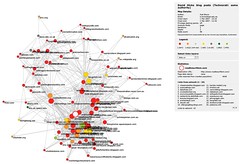Leeds.
 I'm really quite happy with the way that my first real attempts to use the IssueCrawler tool to map the Australian blogosphere have turned out. As I've mentioned here previously, I'm currently exploring this tool as a means of tracing how particularly topics are discussed across the distributed and ad hoc networks of blog-based conversation, and I used the case of Australian-born Guantanamo Bay detainee David Hicks as a case study - with renewed calls for the Australian federal government to urge the Bush administration to finally bring Hicks to trial or release him (he was captured in December 2001, but has not been charged yet), there was increased discussion about Hicks's fate over the last couple of months, and I've been interested to see how this has played out in the blogosphere.
I'm really quite happy with the way that my first real attempts to use the IssueCrawler tool to map the Australian blogosphere have turned out. As I've mentioned here previously, I'm currently exploring this tool as a means of tracing how particularly topics are discussed across the distributed and ad hoc networks of blog-based conversation, and I used the case of Australian-born Guantanamo Bay detainee David Hicks as a case study - with renewed calls for the Australian federal government to urge the Bush administration to finally bring Hicks to trial or release him (he was captured in December 2001, but has not been charged yet), there was increased discussion about Hicks's fate over the last couple of months, and I've been interested to see how this has played out in the blogosphere.
So, my work on this was meant both as an exploration of the methodology for and proof of concept of using IssueCrawler in this context. Overall, I think this has worked pretty well, and I've begun drafting a paper to discuss my approach in detail (most of this was written while waiting around airport lounges during my rather circuitous trip to Ibiza and back last week, incidentally). This first research project is part of my wider work with the Citizen Journalism ARC Linkage project at QUT (for which Terry Flew, Stuart Cunningham, and I are chief investigators), and will also feed into a chapter which QUT PhD student Debra Adams and I have just successfully proposed for the upcoming collection Accented Blogging. I'm not going to post all of my current thoughts on this research work right now, but here's a first overview of what I've found, with a few graphs of the resultant networks: